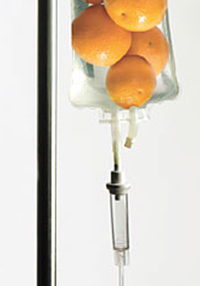
More evidence that low-calorie sweeteners are bad for your health
Studies show that artificial sweeteners can raise the risk of hypertension, metabolic syndrome, type 2 diabetes and heart disease, including stroke.

Natural Health News — High doses of vitamin C, administered intravenously with traditional chemotherapy, helped kill cancer cells while reducing the toxic effects of chemotherapy for some cancer patients.
That’s the conclusion of scientists at the University of Kansas Medical Center. In a study which involved evaluating the therapy in cells, animals and humans, the researchers found that a combination of infused vitamin C and the conventional chemotherapy drugs carboplatin and paclitaxel stopped ovarian cancer in the laboratory, and reduced chemotherapy-associated toxicity in patients with ovarian cancer.
The results of their study have been published in the journal Science Translational Medicine.
In the 1970s, ascorbate, or vitamin C, was an unorthodox therapy for cancer. It was safe, and there were anecdotal reports of its clinical effectiveness when given intravenously.
“But,” explains the study’s senior author, Qi Chen, Ph.D., Assistant Professor in KU Medical Center’s Department of Pharmacology, Toxicology and Therapeutics and the Department of Integrative Medicine, ” after oral doses proved ineffective in two cancer clinical trials, conventional oncologists abandoned the idea. Physicians practising complementary and alternative medicine continued to use it, so we felt further study was in order,”
“What we’ve discovered. “she continued, “is that, because of its pharmacokinetic differences, intravenous vitamin C, as opposed to oral vitamin C, kills some cancer cells without harming normal tissues.”
Reduced toxicity of conventional drugs
The researchers’ clinical trial involved 27 patients with newly diagnosed Stage 3 or Stage 4 ovarian cancer. All of the participants received conventional therapy with paclitaxel or carboplatin, while some were also treated with high-dose intravenous vitamin C. Researchers monitored the participants for five years. Those patients who received vitamin C tended to experience fewer toxic effects from the chemotherapy drugs.
In laboratory rodents, the scientists observed that vitamin C was able to kill cancer cells at the concentrations achievable only by intravenous infusion, with no observable toxicity or pathological changes in the liver, kidney or spleen.
When they looked at what was happening at the cellular level, they found vitamin C surrounded tumour cells acting as a “pro-oxidant,” spurring formation of hydrogen peroxide, which kills cancer cells.
On closer investigation, the researchers found a number of mechanisms through which, acting as a pro-oxidant, vitamin C induced cell death in ovarian cancer cells, including promoting damage to their DNA, without affecting healthy tissue.
Strong evidence
High-dose vitamin C is currently administered intravenously to thousands of patients by practitioners of complementary and alternative medicine, explained one of the study’s co-authors, Jeanne Drisko, M.D., director of the Integrative Medicine program. However, she notes, conventional physicians remain sceptical about its therapeutic benefits. Given this current polarisation of thought, the researchers sought to understand more.
“We aimed to investigate the mechanisms of vitamin C-induced cell death in the laboratory. And in patients with ovarian cancer, we conducted an early phase clinical trial examining safety and toxicity of high dose intravenous vitamin C. We now have a better understanding of vitamin C’s anti-cancer action, plus a clear safety profile, and biological and clinical plausibility with a firm foundation to proceed,”
Drisko adds. “Taken together, our data provide strong evidence to justify larger and robust clinical trials to definitively examine the benefit of adding vitamin C to conventional chemotherapy.”

Please subscribe me to your newsletter mailing list. I have read the
privacy statement